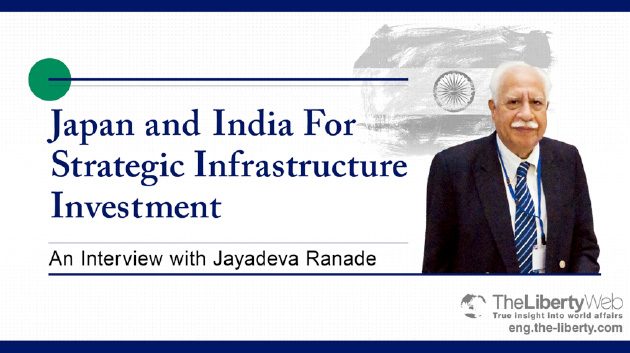Japan and India For Strategic Infrastructure Investment
An Interview with Jayadeva Ranade
Jayadeva Ranade: President of the Centre for China Analysis and Strategy
Ranade is a former Additional Secretary in the Cabinet Secretariat, Government of India, and former Minister in the Indian Embassy in Washington. He is President of the Centre for China Analysis and Strategy and was a Member of the National Security Advisory Board. His publications include “China Unveiled: Insights into Chinese Strategic Thinking”, “Xi Jinping’s China” and “Cadres of Tibet”.
In order to expand the One Belt One Road strategy, China is loaning large sums of money to various countries to force them into a breach of contract. It is a trap that threatens the other country’s sovereignty and independence.
For example, China says, “We’ll build this plant for you. This is the cost estimate.” For example in the case of Sri Lanka, halfway through the project they suddenly said, “Oops, there is a problem. We have to renegotiate the whole thing.” So the cost estimate goes up and the burden of debt on Sri Lanka goes up. So that is what they do. 85% of Sri Lanka’s GDP currently goes to repaying Chinese debt.
For example in the Maldives. Games were played and the Chinese manipulated elections and got another man in [President Yameen] and another man out… and you know what happened. The new president proactively accepted China’s funds for property development and building power plants. These islands will try to return their debt by transferring the rights to their smaller islands, which China can use to build a naval base.
This same thing happened in Hambantota in Sri Lanka. China built a naval base in Djibouti, situated at an important point along the sea route between the Indian Ocean and the Mediterranean. It illustrates China’s ambitions, how they want to expand their reach particularly in the maritime area.
But the Maldives has reversed the situation now. President Yameen of the Maldives was defeated in September 2018, to be replaced by President Solih who wants to move away from relations with China.
In 2017 India helped develop the Chabahar Port in Iran. This port is a strategically important port that will help neutralize China’s efforts to gain access to the Indian Ocean.
Shaving Off China’s Economic Power
Xi Jinping now says that in all the countries that are cooperating in that One Belt One Road, they will build digital platforms in each of those countries, which means China will expand its internet connectivity into all of them, and its cyber espionage.
I think the economic area is one way Japan and India can both work together. We can make investments, for example, in Africa or Southeast Asia. If we take up projects and if we deliver them on time, they will definitely be cheaper; they will definitely not push countries into debt. I think that’s how we need to compete with China.
If Japan and India feel that we can pull someone else in, fine. But if we start bilaterally, we will be able to get others.
I don’t understand Japan’s decision on giving even the limited support to the Belt and Road. When I asked a former Japanese vice-minister about this, he had no answer.
Japan and India are both democracies, and the people are free. So for both our countries, it’s important that we ensure that the seas in Asia and the sea-lanes are safe.



















